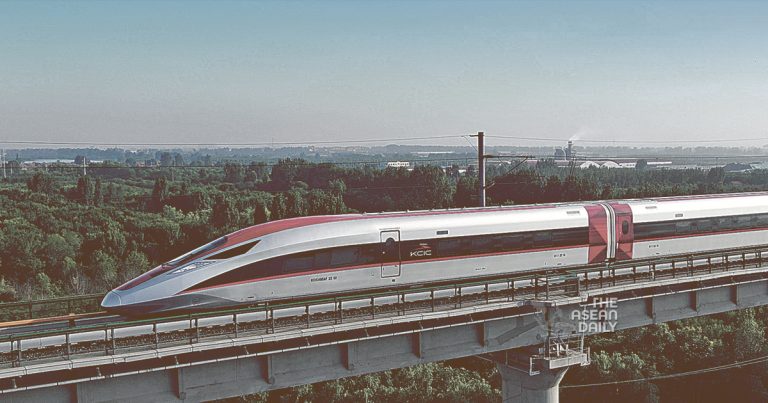6-11-2023 (JAKARTA) In a significant milestone for Indonesia’s connectivity infrastructure, the China-backed Jakarta-Bandung high-speed railway was opened to the public on October 2. The inauguration marked the culmination of a protracted endeavor to introduce high-speed rail to the archipelago. China played a pivotal role in financing the project, channeling funds through its policy banks and state-owned enterprises.
While concerns lingered about China’s potential influence in Southeast Asia’s largest economy, Indonesia took measures to safeguard its sovereignty and minimize the economic impact. Notably, it refrained from staking its state budget as collateral for the project, which had significantly exceeded its original cost estimates.
This infrastructure project, like many others in Southeast Asia, has been viewed through the prism of geopolitical rivalry. On the surface, it appears as a strategic economic win for both Indonesia and China: Indonesia bridges its connectivity infrastructure gaps, while China advances its influence through the Belt and Road Initiative (BRI). However, the project was marred by economic challenges and uncertainties.
Debt Trap Diplomacy?
Commencing in 2016 at the zenith of China’s ambitious BRI, the majority of the Jakarta-Bandung high-speed railway’s financing was supplied by the China Development Bank, with an initial budget of $4.5 billion in concessional financing through Indonesia-China joint ventures. Yet, the project encountered delays due to COVID-19 and logistical issues, leading to a $1.2 billion budget overrun.
To address this overrun, China proposed that Indonesia use its state budget as collateral, raising concerns about China’s engagement in debt trap diplomacy within the developing world. Questions persist about Indonesia’s ability to repay the substantial loan, as China insists on a 3.4% repayment interest rate while Indonesia pushes for a lower 2% rate.
However, China wasn’t the sole source of financing for the project. Originally, the funding competition for the Jakarta-Bandung high-speed railway involved both China and Japan. Japan’s success in addressing Jakarta’s population density challenge by constructing the Jakarta Mass Rail Transit System in the 2000s prompted a proposal to enhance inter-city connectivity through the Bandung-Jakarta high-speed railway.
In 2015, both China and Japan submitted bids, and while China’s proposal offered advantages such as technology transfer, Japan’s insistence on a loan guarantee from the Indonesian government led to its bid’s rejection. This underscores Indonesia’s commitment to maintaining its sovereignty.
Having rejected Japan’s bid on these grounds, Indonesia expected China to adhere to the same principles. However, when Jakarta asked China to cover the budget overruns, a confrontational episode strained the once robust Indonesia-China economic relationship.
Other sizeable infrastructure projects, such as President Joko Widodo’s ambitious plan to relocate Indonesia’s capital to East Kalimantan (Nusantara), initially attracted Chinese funding interest from companies like Alibaba Cloud but ultimately failed to materialize.
Empowering Southeast Asian Countries
The Jakarta-Bandung high-speed railway project underscores Indonesia’s determination to maintain control over such initiatives. This determination is evident in its decision to allocate its own budget to cover cost overruns. A similar trend is emerging across Southeast Asia, with countries opting to safeguard their interests despite the promise of substantial infrastructure investments from China.
The East Coast Rail Link in Malaysia, funded by the Export-Import Bank of China, has faced similar challenges. Stalled since 2016, the project was renegotiated in 2019, reducing the cost from $16 billion to $11 billion. The renegotiation also ensured more favorable terms for Malaysian workers, transforming the investment into a more equitable deal between Malaysia and China.
In Thailand, a high-speed railway connecting Bangkok to Nakhon Ratchasima was to be built by China, securing funds from China’s EXIM Bank and the state-owned enterprise China Railway International Company Limited. While the estimated cost was 179 billion baht ($5 billion), with the Thai government budget contributing 13.2 billion baht, China was to provide the remaining 166 billion baht through concessional financing.
However, Thailand’s Public Debt Management Office raised concerns about the funding conditions, particularly restrictions on technology transfer and the use of Chinese materials and workers. These concerns led to a stalemate, halting the project’s progress.
The Jakarta-Bandung high-speed railway project highlights that, despite China’s significant economic role in development finance, the agency of Southeast Asian countries cannot be underestimated. This trend carries broad implications for the region’s geopolitics, which are often viewed through the lens of US-China rivalry. Southeast Asian nations are inclined to protect their interests without necessarily aligning with a particular “side” or relying on any major power.




